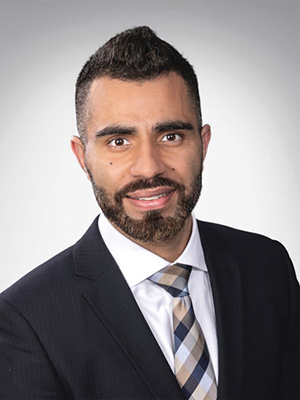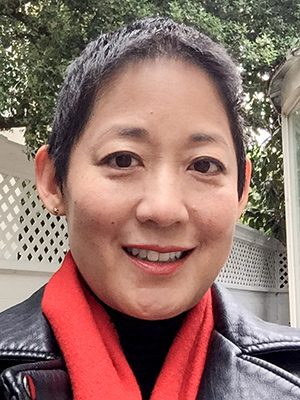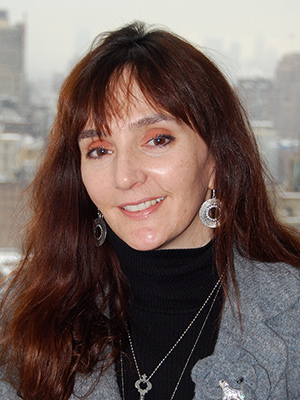How can I avoid exposing my loved one to the coronavirus?

Rohit Gosain,
medical oncologist and hematologist at UPMC Hillman Cancer Center at UPMC Chautauqua in Jamestown, New York. Photo courtesy of Rohit Gosain
ROHIT GOSAIN: For cancer patients, timely diagnosis, evaluation and treatment are critical, even during a pandemic. But cancer patients can be immunocompromised and are at increased risk of more severe COVID-19 and a poor outcome if they do get sick. Pragmatic approaches are needed to deal with the challenges of treating and caring for your loved one with cancer, without jeopardizing their health.
To protect your loved one, the most important thing is to wear a mask when you are out. This is especially important when one can’t maintain a social distance of at least six feet. Also, wash your hands often and use hand sanitizer. Avoid crowded places. You as a caregiver could unknowingly become an asymptomatic carrier and expose your loved one to the coronavirus.
All of these steps are even more important when cancer patients have low blood counts, especially low neutrophil counts, or neutropenia. When a person with cancer has neutropenia, it puts them at very high risk of getting an infection despite taking measures to stay safe. In that case, I would advise that you and your loved one don’t go to grocery stores or anywhere else. Stay home.
Medical appointments are very important, and there is nothing restricting your loved one from going to the clinic. However, if they are showing symptoms of COVID-19—for example, high temperature or respiratory difficulties—they should be tested for the coronavirus and not take the chance of infecting others by going in for an appointment. Also, be mindful of others by monitoring yourself for any symptoms of COVID-19.
Until a COVID-19 vaccine is widely distributed, these precautions are all we can do to protect ourselves and others. Knowing the right thing to do will get more complicated as we enter the flu season, because it will be hard to distinguish between COVID-19 and the flu.
CANCER AND COVID-19 // The American Cancer Society offers information about routine care during a pandemic. // Fred Hutchinson Cancer Research Center shares information on how COVID-19 affects people with cancer.
My cancer has returned. How should I tell people?

Susan Kobayashi, member of Bay Area Young Survivors, living with metastatic breast cancer in San Francisco. Photo courtesy of Susan Kobayashi
SUSAN KOBAYASHI: I had stage 0 breast cancer, also known as ductal carcinoma in situ, twice. My first diagnosis came at age 36. Because I was stage 0, I didn’t tell most people outside of my family that I had cancer. I never had chemo, but I did have surgery. At the time, I didn’t realize that I had any risk of dying of cancer, so I didn’t feel like I had to tell everyone about it.
When I became metastatic eight years later, then I really had to tell people. I was bald and lost 30 pounds. At that point, it was obvious. Everybody is different, so you have to do what’s right for you. But for me, I’ve never tried to hide having metastatic cancer. I’ll talk about it with anyone. It’s not something you need to feel ashamed about.
Early on, there were some difficult conversations. I’d had many years without any evidence of disease. I found out I had stage IV breast cancer after I noticed my vision starting to deteriorate. The ophthalmologist said there was a tumor in my eye and it was probably metastatic cancer. My oncologist found the cancer in my brain, lungs, bone and breast. I had to make some hard phone calls to my parents, siblings and friends to let them know I had stage IV cancer.
That was very hard, because people assumed that I would die within six months. At the time, I probably also thought that. I think it would have been a bigger shock if I hadn’t already had stage 0 breast cancer, but many of my friends were sobbing. Some of them couldn’t see me for a time because they were so upset. Now, 6 1/2 years later, with treatments holding the cancer in check, I don’t know how much they even think about it.
Before my diagnosis, I’d never met anyone with stage IV cancer. Now, through a wonderful support group, I’ve met so many women who’ve lived with it for many years like I have. If I had known in the beginning what I know now—that a lot of people do live a long time and that often advanced cancer can be almost like a chronic disease—I might have been more positive. I probably could have handled those first calls better. And perhaps now you can too.
TALKING ABOUT RECURRENCE // The National Cancer Institute offers advice to patients on talking about advanced cancer. // Fox Chase Cancer Center recommends choosing your words carefully when talking about cancer.
I’ve lost my employer-sponsored health insurance. What now?

Claire Grainger, oncology social worker at CancerCare in Paramus, New Jersey. Photo courtesy of Claire Grainger
CLAIRE GRAINGER: Losing a job and health insurance can be a highly emotional and triggering event. The first step is to calm yourself so that you can develop a strategy that’s well thought out. Remember when looking for another health insurance plan that you can’t be denied coverage or charged more due to your preexisting condition of cancer.
Next, consider your options. If you have a spouse whose employer offers health insurance, you should investigate it. Your spouse should discuss it with the human resources department to find out the particulars of cost and coverage. You will want to ensure that your treatment team, treatment center and medications will be covered under the new plan.
Another possibility is COBRA continuation coverage. COBRA is a federal law that usually allows you up to 18 months of continued coverage on your former employer’s insurance. Depending on the circumstances, it’s possible this won’t be an option—for example, if the company has gone out of business. But if it is available, it’s also likely to be expensive. You will most likely have to pay the full cost of being insured, plus a small administrative fee. The great thing about COBRA is that you can often continue your treatment without any interruption.
Your third option is to buy a plan through your state’s health insurance marketplace. You have 60 days from the point of losing your insurance to enroll in a new plan through the marketplace. If you signed up for COBRA continuation coverage, you may have to wait for an open enrollment period before you can switch to another plan through the marketplace.
Financial assistance may also be available to you. If you will be unable to work for a year, consider applying for Social Security disability benefits. Contact your state Medicaid agency to find out if you are eligible for Medicaid. Call your county government or elected representatives to see what other programs are available. COVID-19 has prompted some new programs that aren’t yet widely known. They might not pay your insurance premiums, but they could provide assistance with utilities, rent or mortgage to free up money to pay for health insurance.
I often suggest finding a reputable credit counseling service to help you get your finances in order. You might also call the billing department at your treatment center to find out if you can pay on a sliding scale, are eligible for a payment assistance program or can choose among different payment options that might be easier to handle. There are many resources out there to help you in this difficult time.
FINDING NEW INSURANCE // Healthcare.gov will help you find out if you can enroll in or change insurance plans and whether you’re eligible for Medicaid. // CancerCare can connect you to social workers who will help you navigate insurance options and other resources.
Cancer Today magazine is free to cancer patients, survivors and caregivers who live in the U.S. Subscribe here to receive four issues per year.




